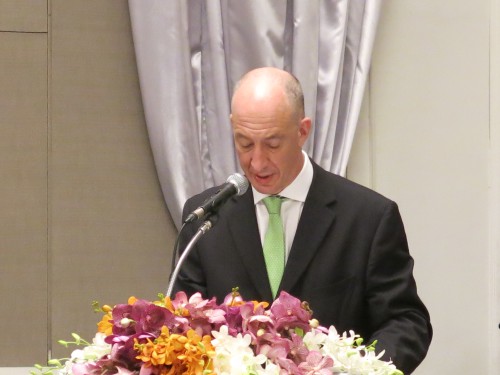I am very pleased to see that Thailand is becoming a member of the Construction Sector Transparency Initiative (CoST). In doing so, Thailand commits to implement CoST’s international standards by establishing a disclosure and assurance system to enhance transparency in public construction projects. Such a system will build trust in decision-making, help to ensure value for money, and send a clear message about Thailand’s intentions to tackle the risk of corruption. It is a bold and welcome initiative.
CoST was initiated in 2008 with the support of the UK Government (Department for International Development; DfID) and the World Bank to develop a mechanism and a standard for disclosure of information in public construction projects. CoST tackles corruption in construction projects by collating, analysing and publicly presenting information in a way that makes it easier to understand and inspect. This helps to ensure that public money is spent effectively.
Thailand’s decision to join CoST encourages us all to think about how we tackle corruption. In all countries, fighting corruption is a duty for all sectors of society: politicians, the government, the private sector, the civil service, the armed forces and the general public. It is a civic duty, not a political position.
Societies that tackle corruption effectively stand a better chance of ensuring their citizens can benefit from equal opportunities, free from improper influence or undue patronage. In turn, equal opportunities allow people to use their talents and skills to the full, to make better choices for themselves and their families. This leads to more productive and fulfilling lives, to greater harmony, to more sustained development.
Corruption often flourishes where there is overly burdensome bureaucracy, a lack of checks and balances and a lack of transparency. It is often said that sunlight is the best disinfectant. Corrupt practices struggle when faced with a requirement to disclose information and where procedures are simple and easy to access, including online.
A free media has an important role to play in this. It allows more information to be more accessible to a greater number of people. This helps to sort good information from bad. A free media encourages policies and decisions to be subject to greater critical scrutiny. This helps policymakers weigh up difficult choices. And investigative journalism is shown to be useful in exposing cases of corruption.
Tackling corruption is not just about prevention, but also enforcement. The law must be scrupulously followed to ensure all those guilty of malfeasance are brought to justice. It must not be used to selectively to benefit one group over another or to prosecute just lower level cases.
The institutions tasked to fight corruption must pursue their duties in a way which is neutral and free from bias or political influence. This is essential if they are to gain the long-term credibility and respect necessary to carry out their role effectively.
Longer term civic education is also an important element to make citizens understand that corruption has a direct impact on everyone.
The British Embassy is proud to have been invited to work closely with the Thai Government, the International CoST Secretariat, and relevant agencies to provide capacity building support to Thai partners to establish the disclosure and assurance system required under CoST. The UK Government is very pleased to see that the Airports of Thailand has committed to join the CoST programme as a pilot project. It will implement the CoST standard for the first time in Thailand in its expansion of Suvannabhumi Airport.
Finally, I would like to thank and congratulate Thailand once again on this bold initiative. As a trusted partner of Thailand, we will do all that we can to make it a success.

